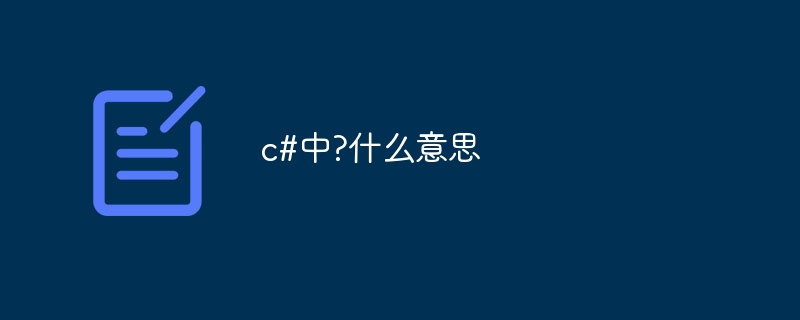What does it mean in c#?
The ? operator (null coalescing operator) in C# is used to provide an alternative value when a variable may be null. The syntax is variableName ?? defaultValue, if variableName is not null, its value is returned, otherwise an alternative value is returned. It provides the advantages of simplicity, readability, and avoidance of null pointer exceptions.

? in C# Operator
in C# The ## operator, also known as the null coalescing operator or the ternary conditional operator, is a concise syntax for providing an alternate value in cases where a variable might be null.
Syntax and usage
? The format of operator usage is:
variableName ?? defaultValue;
- variableName
is the variable to check. - ??
is the null coalescing operator. - defaultValue
is the fallback value returned ifvariableNameisnull.
variableName is not null, its value is returned. Otherwise, defaultValue is returned.
Example
The following code demonstrates the use of the? operator:
string name = null; // 使用 ? 运算符提供备用值 string result = name ?? "Unknown"; Console.WriteLine(result); // 输出 "Unknown"
Advantages
Advantages of using the? operator include:
- Simplicity: It provides a concise way to handle possible null
variables to avoid lengthy if-else statements. - Readability: It improves the readability of the code because the behavior of the alternate values is clearly expressed.
- Avoid Null Pointer Exceptions: You can avoid unexpected Null Pointer Exceptions by checking whether a variable is null
before accessing it.
The above is the detailed content of What does it mean in c#?. For more information, please follow other related articles on the PHP Chinese website!

Hot AI Tools

Undresser.AI Undress
AI-powered app for creating realistic nude photos

AI Clothes Remover
Online AI tool for removing clothes from photos.

Undress AI Tool
Undress images for free

Clothoff.io
AI clothes remover

AI Hentai Generator
Generate AI Hentai for free.

Hot Article

Hot Tools

Notepad++7.3.1
Easy-to-use and free code editor

SublimeText3 Chinese version
Chinese version, very easy to use

Zend Studio 13.0.1
Powerful PHP integrated development environment

Dreamweaver CS6
Visual web development tools

SublimeText3 Mac version
God-level code editing software (SublimeText3)

Hot Topics
 Active Directory with C#
Sep 03, 2024 pm 03:33 PM
Active Directory with C#
Sep 03, 2024 pm 03:33 PM
Guide to Active Directory with C#. Here we discuss the introduction and how Active Directory works in C# along with the syntax and example.
 Access Modifiers in C#
Sep 03, 2024 pm 03:24 PM
Access Modifiers in C#
Sep 03, 2024 pm 03:24 PM
Guide to the Access Modifiers in C#. We have discussed the Introduction Types of Access Modifiers in C# along with examples and outputs.
 Random Number Generator in C#
Sep 03, 2024 pm 03:34 PM
Random Number Generator in C#
Sep 03, 2024 pm 03:34 PM
Guide to Random Number Generator in C#. Here we discuss how Random Number Generator work, concept of pseudo-random and secure numbers.
 C# Data Grid View
Sep 03, 2024 pm 03:32 PM
C# Data Grid View
Sep 03, 2024 pm 03:32 PM
Guide to C# Data Grid View. Here we discuss the examples of how a data grid view can be loaded and exported from the SQL database or an excel file.
 C# StringReader
Sep 03, 2024 pm 03:23 PM
C# StringReader
Sep 03, 2024 pm 03:23 PM
Guide to C# StringReader. Here we discuss a brief overview on C# StringReader and its working along with different Examples and Code.
 Patterns in C#
Sep 03, 2024 pm 03:33 PM
Patterns in C#
Sep 03, 2024 pm 03:33 PM
Guide to Patterns in C#. Here we discuss the introduction and top 3 types of Patterns in C# along with its examples and code implementation.
 C# Serialization
Sep 03, 2024 pm 03:30 PM
C# Serialization
Sep 03, 2024 pm 03:30 PM
Guide to C# Serialization. Here we discuss the introduction, steps of C# serialization object, working, and example respectively.
 BinaryWriter in C#
Sep 03, 2024 pm 03:22 PM
BinaryWriter in C#
Sep 03, 2024 pm 03:22 PM
Guide to BinaryWriter in C#. Here we discuss syntax and explanation, how it works with examples to implement with proper codes.






